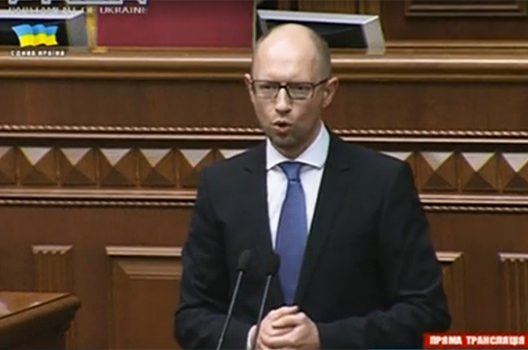
With Early Elections, Will Political Infighting Revive?
Yesterday’s announced resignation of Ukrainian Prime Minister Arseniy Yatsenyuk is a potential step toward strengthening Ukraine’s government – but also a political risk that deepens the uncertainties facing Ukraine at least for the coming months.
The potential to strengthen the government is this: Ukraine needs a new parliament, and the breakup of the existing coalition is the only way to get it.
Ukraine’s parliament, which was elected in a disputed 2012 election, is heavily laced with corrupt and ineffective legislators who were part of the political machine of former President Viktor Yanukovych. Many parliament members barely show up for work, and a large bloc of them is deeply resistant to the political and economic reforms needed to make Ukraine’s government more effective and responsive to its people. This parliament’s term runs until 2017, meaning that essential work in reforming the government could be delayed for a dangerously long time. A breakup of the current ruling coalition is virtually the only way open for the new president, Petro Poroshenko, to force early parliamentary elections — a step toward democracy that has been urged by many of the forces from last winter’s Maidan movement.
The Risk: A New Round of Old Infighting
But the risks of a parliament election in the coming months are very real. The independent Ukraine of the past two decades has a dispiriting history of political bickering that has undermined movements toward democracy. It was such infighting that undermined the democratic gains of the 2004 Orange Revolution. After public protests forced the cancellation of a highly dubious and disputed election, the more nominally pro-democratic leaders who then won a fairer vote quickly fell into factional infighting that paralyzed the government. Ukrainians will fear – and their international partners should fear as well – that a parliamentary election now could revive old political factionalism just as the government is fighting Russia’s proxy militias in the southeast and skating close to bankruptcy to do it.
Yatsenyuk announced his resignation yesterday after two of the three parties in his ruling coalition – the UDAR of Kyiv mayor and former boxer Vitaliy Klitschko, and the nationalist Svoboda party – informed him that they were pulling out to force those new elections. Poroshenko commended their withdrawal, which clearly was done with his support.
Yatsenyuk has been scathing in his condemnation of the current parliament for its resistance to reforms, but he also was emotional in warning yesterday of the dangers of the sudden move to elections. “Who wants to go to elections and simultaneously vote for unpopular laws?” he asked. “Putting narrow political interests above the future of the nation is impermissible. It is a moral and ethical crime.” Both Yatsenyuk and his finance minister, Oleksandr Shlapak, said the government is just days from running out of money for its operations, including the war.
While “the government resignations clear the way” for early elections to the parliament, noted the Atlantic Council’s John Herbst, “ it’s not a welcome development. There is a lot to be concerned about. Government unity is important for dealing with the current security dangers, but this is something for Ukrainians to work out,” said Herbst a former US ambassador to Ukraine who head’s the Council’s Eurasia Center.
One Uncertainty: Yatsenyuk’s Future
The first announcements surrounding Yatsenyuk’s resignation left unclear how a caretaker government will be arranged to keep the government running while elections are organized for this fall. President Poroshenko said he expected Yatsenyuk and his cabinet to stay in place. But reports from Kyiv also said that Deputy Prime Minister Volodymyr Groysman might be asked to step in if Yatsenyuk does not remain. Groysman recently has been directing the government’s commission to investigate this month’s shooting down of Malaysia Airlines Flight 17.
One uncertainty from the announcements is Yatsenyuk’s own future. He has won respect, both in Kyiv and among his international partners, for his handling of the government after the ouster of President Yanukovych in Februbary. He negotiated with the International Monetary Fund its bailout of Ukraine from a crushing debt load, and his government oversaw a credible election of President Poroshenko.
But Yatsenyuk has little political base of his own. He is a member of the Batkivshchyna (“Fatherland”) party, which is led by former Prime Minister Yulia Tymoshenko. She was at the center of the infighting years ago that undermined the Orange Revolution. She finished second to Poroshenko in May’s election, and remains an ambitious political player eager to return to the center stage of Ukraine’s power politics.
“This is a game of political musical chairs and suddenly Yatsenyuk is without a chair,” said Atlantic Council senior fellow Adrian Karatnycky.
Image: Ukrainian Prime Minister Arseniy Yatsenyuk gives his resignation speech in Ukraine’s Parliament on July 24, 2014.
